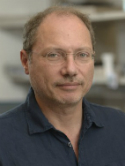Specification of tissue-resident macrophages during organogenesis Journal Article
| Authors: | Mass, E.; Ballesteros, I.; Farlik, M.; Halbritter, F.; Günther, P.; Crozet, L.; Jacome-Galarza, C. E.; Händler, K.; Klughammer, J.; Kobayashi, Y.; Gomez-Perdiguero, E.; Schultze, J. L.; Beyer, M.; Bock, C.; Geissmann, F. |
| Article Title: | Specification of tissue-resident macrophages during organogenesis |
| Abstract: | Tissue-resident macrophages support embryonic development and tissue homeostasis and repair. The mechanisms that control their differentiation remain unclear. We report here that erythro-myeloid progenitors in mice generate premacrophages (pMacs) that simultaneously colonize the whole embryo from embryonic day 9.5 in a chemokine-receptor-dependent manner. The core macrophage program initiated in pMacs is rapidly diversified as expression of transcriptional regulators becomes tissue-specific in early macrophages. This process appears essential for macrophage specification and maintenance, as inactivation of Id3 impairs the development of liver macrophages and results in selective Kupffer cell deficiency in adults. We propose that macrophage differentiation is an integral part of organogenesis, as colonization of organ anlagen by pMacs is followed by their specification into tissue macrophages, hereby generating the macrophage diversity observed in postnatal tissues. Copyright © 2016 by the American Association for the Advancement of Science; all rights reserved. |
| Keywords: | mus |
| Journal Title: | Science |
| Volume: | 353 |
| Issue: | 6304 |
| ISSN: | 0036-8075 |
| Publisher: | American Association for the Advancement of Science |
| Date Published: | 2016-09-09 |
| Start Page: | aaf4238 |
| Language: | English |
| DOI: | 10.1126/science.aaf4238 |
| PROVIDER: | scopus |
| PUBMED: | 27492475 |
| PMCID: | PMC5066309 |
| DOI/URL: | |
| Notes: | Article -- Export Date: 3 October 2016 -- Source: Scopus |
Altmetric
Citation Impact
BMJ Impact Analytics
MSK Authors
Related MSK Work








